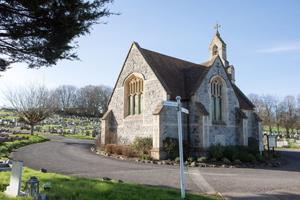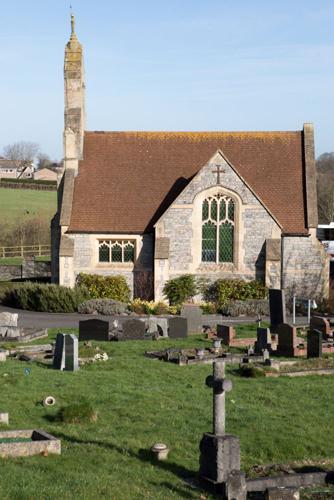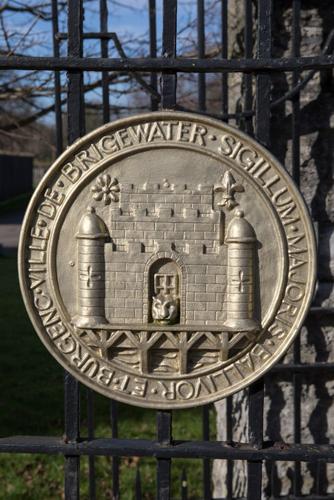Burial Times
Between 1st April and 30th September
Burials may take place 9.00am to 3.00pm Monday to Thursday and 9.00am to 2.00pm on a Friday.
Interment of Ashes may take place 9.00am to 3.30pm Monday to Thursday and 9.00am to 2.30 pm on a Friday.
Between 1st October and 31st March
Burials may take place 9.00am to 2.30pm Monday to Thursday and 9.00am to 1.30pm on a Friday.
Interment of Ashes may take place 9.00am to 3.30pm Monday to Thursday and 9.00am to 2.30 pm on a Friday.
Chapel at Quantock Road Cemetery
The chapel is available for services, it seats 38 and there is an organ available (you will need to provide the organist)

Burial documentation
A completed notice of interment is required for each interment and this must be received at least 3 working days before. This notice sets out all the information required by the cemetery for completion of the burial records and also for the preparation of the grave. Sometimes it includes an application for a grave purchase, too. In addition the registration document (green form), or a Coroners form (white form), or the certificate of disposal. Please note that an interment cannot proceed without the above documentation.
Funerals without a funeral director
If families choose not to use a funeral director to make the burial arrangements, the staff of the crematorium and cemetery office will be happy to help them.
Grave options
Lawn Section – this section offers a more tranquil contemporary location where you are only allowed a headstone and no items are to be placed on the length of the grave. They look neat and are easily accessed.

Traditional Section – this section offers more choice with regard to memorials and kerb sets and ledgers are permitted.
Garden of Rest – this section if for cremated remains. Up to 3 caskets may be buried in each grave space.
Children’s area – this section can accommodate a coffin size up to 3ft by 2ft. There is an area for burial and another for cremated remains and a baby under 24 weeks gestation.
Muslim burials (Bristol Road Cemetery only) – this section has been set aside for Muslim burials and both headstones and kerb sets are allowed in this section.
Re-open an existing grave – if the deceased is the owner of the Exclusive Right of Burial then they have the automatic right to be buried in that grave. If the owner of the Exclusive Right of Burial is already dead then a transfer of the Exclusive Right of Burial is required before an interment can take place. Please contact the Cemeteries Administrator for more information.
Grave Depths
In both Cemeteries graves may be dug to 2 depths:
- 6ft which allows for 2 burials in the grave
- 4ft 6ins which is a single grave
- And in some circumstances 7ft to accommodate 3 burials, but this is not possible in all burial areas
Purchasing a grave space
When a grave is purchased the purchaser is not, in fact, buying the land the grave occupies, but rather is purchasing the right to be buried there, or to say who else may be buried there. This is called purchasing the Exclusive Right of Burial. Right may be purchased for a set number of years. In Bridgwater the rights may be purchased for 50 years. At the end of the period the right may be renewed for a further period.
When the purchase is made a grave Deed is issued by the burial authority. This is a contract between the burial authority and the grave owner.
It is not necessary to purchase a grave in order to arrange a burial, but your choices will be much more limited if you don’t.
Reservations
Bridgwater Town Council no longer allows reservations of grave spaces, and cremation plots.
Grave Ownership and Deed Transfers
Exclusive Rights of Burial
A Grant of Exclusive Right of Burial (ERoB) is issued when a person has purchased the rights to bury in an agreed grave plot. An Exclusive Right of Burial does not constitute any ownership of land; the land remains in the Council’s ownership. The grant should be kept in a safe place as it may be required if the grave is to be re-opened or additional work to a memorial is required.
The Exclusive Rights of Burial for a grave plot are available to purchase at the time of need. To book a burial, you or your appointed funeral director can contact us on 01278 427692.
The grant of Exclusive Right of Burial is initially granted for 50 years.
The Grant of Exclusive Right of Burial does not include permission to erect a memorial. The right to erect a memorial must be applied for separately. The owner(s) of the right to erect a memorial must be the same as the owner of the Exclusive Right of Burial. The owner of the Exclusive Right of Burial will be responsible for the maintenance and upkeep of a memorial stone placed on it.
Transfer of Grave Rights
The Exclusive Rights of Burial may be transferred by the owner to another person for the remaining term of the period that the Right was granted for. The living owner must be aware the transfer of their rights means they do not have an automatic right to be buried in the plot themselves upon their death. If the living owner of the Exclusive Rights of Burial wishes to transfer the Rights to another person a Form of Assignment must be completed.
If a grave owner passes away without arranging for the transfer of deeds, this can give rise to problems when descendants wish to use the grave. The Council is unable to simply grant further burials upon request and must be satisfied that any person claiming ownership of the grave is legally entitled to it. It is therefore important that any transfer of ownership is notified and evidenced to the Council at the earliest opportunity.
Where there is uncertainty about the grave ownership, the Council recommends that you resolve this as soon as possible to avoid the distress of trying to sort out any problems at short notice and before a funeral.
Before proceeding with any arrangements, or making any decisions please view our Guidance notes to explain the transfer procedure.
If the original owner is deceased and left a valid Will and Estate of a value that requires Grant of Probate, ownership can be transferred by the Executor to the rightful owners under the will i.e. the Beneficiaries on production of the Grant of Probate. The Executors are then responsible for identifying the rightful owner and complete the transfer by a Form of Assent.
If the original owner has died without a will (otherwise known as intestate), then Letters of Administration may be obtained and ownership can be transferred to rightful owner by the administrator. The rightful owner is determined by legislation (known as the Rules of Intestate).
The Executors/Administrators are responsible for identifying the rightful owner and completing the transfer by a Form of Assent.
If there is no Grant of Probate or Letters of Administration, for example where the estate is of insufficient value to merit application, it will be necessary for a legally binding Statutory Declaration to be drawn up as explained below.
In all cases there can be a maximum of four owners per grave. Other beneficiaries must sign a Form of Renunciation to relinquish their rights to ownership.
Please note we strongly recommend that parties seek independent legal advice when dealing with a deceased estate.
Statutory Declaration
This is a legal document produced by the Cemeteries Office, which must then be signed in the presence of a Solicitor, Magistrate or Commissioner for Oaths
The Statutory Declaration will be prepared by Bridgwater Town Council and will clearly set out the facts regarding the original purchase of the Exclusive Rights of Burial, the death of the registered owner, intestate or otherwise and the relationship between the deceased and the rightful owner to the who is entitled to the Exclusive Rights for the remaining period. There is a charge for this.
The Statutory Declaration will set out the facts regarding the original purchase of the Exclusive Rights, the death of the registered owner, intestate or otherwise and the relationship of the applicant to the registered owner. The original Deed or Grant should accompany the Declaration, if available. A form of Renunciation must be completed by all other next of kin of the deceased owner, and attached to the Declaration. The Council may ask for a certified copy of the owner’s death certificate in certain situations.
Family Disputes
The Council cannot become involved where there is a family dispute over any ownership or where there is a stalemate and relevant consents are withheld. The various next of kin should endeavour to reach some form of agreement between themselves or, if that fails, seek independent legal advice. Until such problems are resolved, the Council may not register any transfer of ownership of the Grave Deed.
Exhumations
Exhumations may occur for a number of reasons, including:
- Movement from the original grave to another at the request of the family.
- Repatriation of the body overseas.
- Transfer from a cemetery scheduled for re-development.
- As a result of a court order because forensic examination of the body is required.

Exhumation is a serious and expensive process, and should not be undertaken without a lot of thought. The legal process requires that the whole family agree that exhumation is the right choice.
- It is an offence to exhume any human remains without first obtaining the necessary lawful permissions. Funeral Directors, in connection with the burial authority, will help in obtaining these.
- If the body is buried in un-consecrated ground a licence must be obtained from the Home Office. The exhumation licence will set out the conditions that have to be observed.
- If the body is buried in consecrated ground, permission from the church authorities (a faculty) must be obtained.
- If the body is to be reburied in consecrated ground, a faculty must be obtained.
Usually the exhumation will take place early in the morning, while the cemetery is still closed to the public. The area in which the exhumation takes place should be screened off, in order to maintain the dignity of the deceased, and to preserve public decency. In order to ensure that public safety and decency are preserved throughout the exhumation process, an Environmental Health Officer must be present. If the conditions of the licence cannot be met, or there are public health or decency concerns, the exhumation may not proceed.

